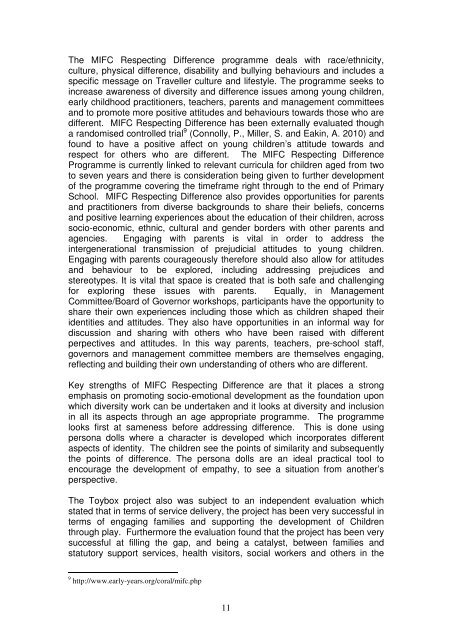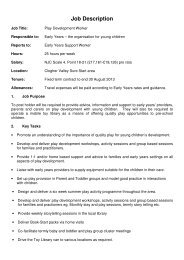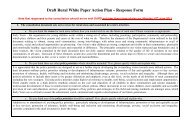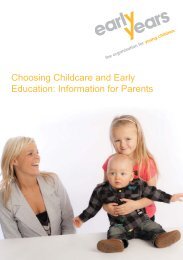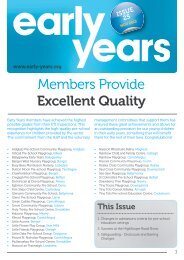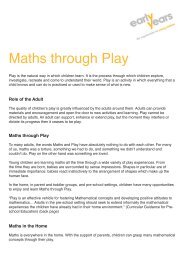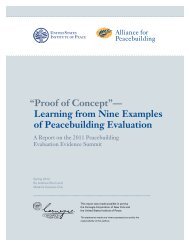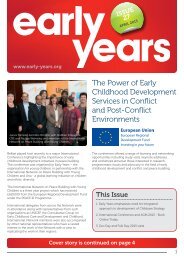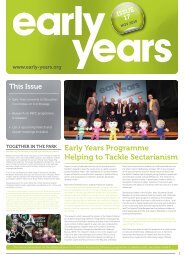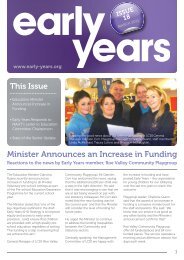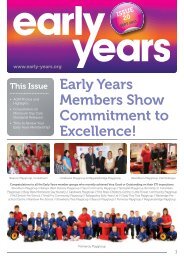Traveller Child in Education Action Framework - Early Years
Traveller Child in Education Action Framework - Early Years
Traveller Child in Education Action Framework - Early Years
You also want an ePaper? Increase the reach of your titles
YUMPU automatically turns print PDFs into web optimized ePapers that Google loves.
The MIFC Respect<strong>in</strong>g Difference programme deals with race/ethnicity,culture, physical difference, disability and bully<strong>in</strong>g behaviours and <strong>in</strong>cludes aspecific message on <strong>Traveller</strong> culture and lifestyle. The programme seeks to<strong>in</strong>crease awareness of diversity and difference issues among young children,early childhood practitioners, teachers, parents and management committeesand to promote more positive attitudes and behaviours towards those who aredifferent. MIFC Respect<strong>in</strong>g Difference has been externally evaluated thougha randomised controlled trial 9 (Connolly, P., Miller, S. and Eak<strong>in</strong>, A. 2010) andfound to have a positive affect on young children’s attitude towards andrespect for others who are different. The MIFC Respect<strong>in</strong>g DifferenceProgramme is currently l<strong>in</strong>ked to relevant curricula for children aged from twoto seven years and there is consideration be<strong>in</strong>g given to further developmentof the programme cover<strong>in</strong>g the timeframe right through to the end of PrimarySchool. MIFC Respect<strong>in</strong>g Difference also provides opportunities for parentsand practitioners from diverse backgrounds to share their beliefs, concernsand positive learn<strong>in</strong>g experiences about the education of their children, acrosssocio-economic, ethnic, cultural and gender borders with other parents andagencies. Engag<strong>in</strong>g with parents is vital <strong>in</strong> order to address the<strong>in</strong>tergenerational transmission of prejudicial attitudes to young children.Engag<strong>in</strong>g with parents courageously therefore should also allow for attitudesand behaviour to be explored, <strong>in</strong>clud<strong>in</strong>g address<strong>in</strong>g prejudices andstereotypes. It is vital that space is created that is both safe and challeng<strong>in</strong>gfor explor<strong>in</strong>g these issues with parents. Equally, <strong>in</strong> ManagementCommittee/Board of Governor workshops, participants have the opportunity toshare their own experiences <strong>in</strong>clud<strong>in</strong>g those which as children shaped theiridentities and attitudes. They also have opportunities <strong>in</strong> an <strong>in</strong>formal way fordiscussion and shar<strong>in</strong>g with others who have been raised with differentperpectives and attitudes. In this way parents, teachers, pre-school staff,governors and management committee members are themselves engag<strong>in</strong>g,reflect<strong>in</strong>g and build<strong>in</strong>g their own understand<strong>in</strong>g of others who are different.Key strengths of MIFC Respect<strong>in</strong>g Difference are that it places a strongemphasis on promot<strong>in</strong>g socio-emotional development as the foundation uponwhich diversity work can be undertaken and it looks at diversity and <strong>in</strong>clusion<strong>in</strong> all its aspects through an age appropriate programme. The programmelooks first at sameness before address<strong>in</strong>g difference. This is done us<strong>in</strong>gpersona dolls where a character is developed which <strong>in</strong>corporates differentaspects of identity. The children see the po<strong>in</strong>ts of similarity and subsequentlythe po<strong>in</strong>ts of difference. The persona dolls are an ideal practical tool toencourage the development of empathy, to see a situation from another’sperspective.The Toybox project also was subject to an <strong>in</strong>dependent evaluation whichstated that <strong>in</strong> terms of service delivery, the project has been very successful <strong>in</strong>terms of engag<strong>in</strong>g families and support<strong>in</strong>g the development of <strong>Child</strong>renthrough play. Furthermore the evaluation found that the project has been verysuccessful at fill<strong>in</strong>g the gap, and be<strong>in</strong>g a catalyst, between families andstatutory support services, health visitors, social workers and others <strong>in</strong> the9 http://www.early-years.org/coral/mifc.php11


